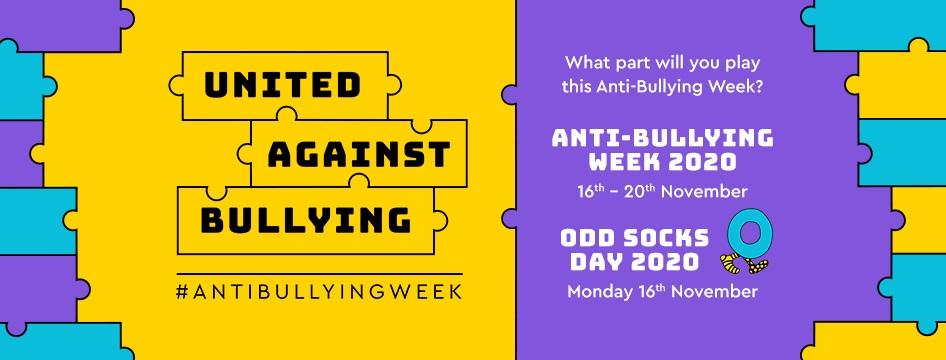
Published on: 19/11/20
With the theme 'United Against Bullying' we share tips on dealing with bullying.

Published on: 19/11/20
United Against Bullying is the theme for Anti-Bullying Week 2020, run by the Anti-Bulling Alliance.
The week runs from Monday 16th - Friday 20th November, with many activities running and resources available.
The Anti-Bulling Alliance worked with over 300 young people and 100 members of school staff to develop this year’s theme. It has also created an Anti-Bullying Week 2020 manifesto for change:
“This year, more than ever, we’ve witnessed the positive power that society can have when we come together to tackle a common challenge.
“Anti-Bullying Week is no different. Bullying has a long lasting effect on those who experience and witness it. But by channelling our collective power, through shared efforts and shared ambitions, we can reduce bullying together. From parents and carers, to teachers and politicians, to children and young people, we all have a part to play in coming together to make a difference.
“We’re all a piece in the puzzle, and together, we’re united against bullying.”
We’re sharing our tips on dealing with a bully. These are taken from from Me and my brain, our handbook for teenagers affected by acquired brain injury, which you can order here.
It’s important to feel safe. Never put yourself in a situation where you might be in danger or will be open to assault.
• Don’t be on your own. Where possible stick in a crowd or with a group of friends. A bully is less likely to start on you if you are with people. It is also a good idea if you are worried about physical bullying, where you may be assaulted.
• Walk away. You should try to ignore a bully and walk away with your head held high. This body language will show them that you are confident (even if you don’t really feel that way). Sometimes walking away is even harder than losing your temper but it’s not a cowardly move. Chances are sooner or later the bully will get bored with trying to bother you.
• Stay calm. It might be really tempting to lose your temper and even lash out at a bully. But try your best to hold back, no matter what they say to upset you. If you get angry a bully will know they have control over your emotions.
• Write a diary. Note down times when you have been bullied and who was involved. This will help if you need to report the bullying.
• Tell someone. Talk to someone who will be able to support you such as a friend, teacher or family member.

Our series of free books and resources aimed at children and families (P&P costs only).

Read our guide to managing the return to school after an acquired brain injury.